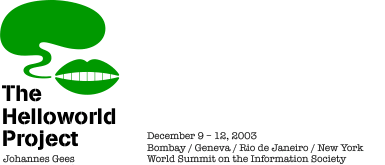Casa Fat Radish, Rio de Janeiro
NYC’s The Fat Radish restaurant and Absolut Elyx support social reform through local food and drink

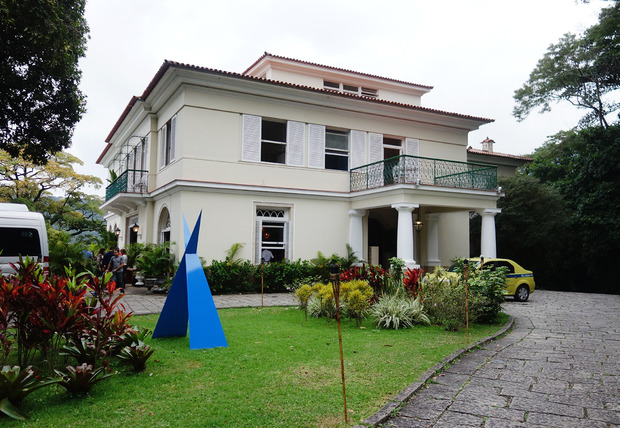
Any monumental event—from annual art fairs to sports tournaments—is now a major playground for companies to leave their mark on a captive audience. The branded hoopla oftentimes feels awkward, but when lured by free swag and booze, it’s rarely questioned. So when the New York restaurant The Fat Radish popped up in Rio de Janeiro during World Cup this year, many could have assumed it was an excuse to entertain Brazil’s jet-setting celebrities. But the humble restaurant had a different mission and they, along with Absolut Elyx, used the opportunity as a chance to give back to the community by creating greater awareness of eating farm-to-table, while raising money through charity auctions for Gastromotiva, an organization dedicated to social reform through food.
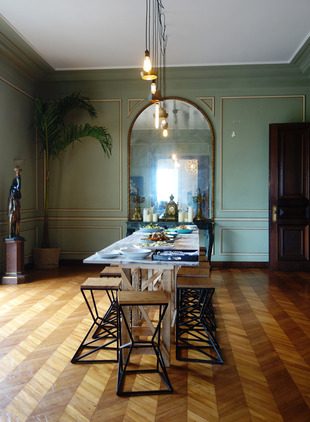
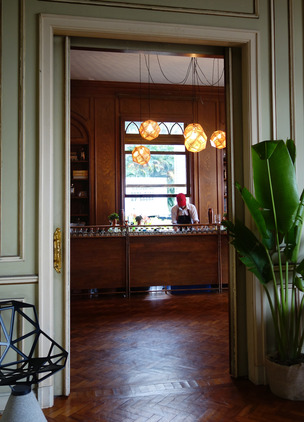
We sat down with The Fat Radish’s co-founder, Phil Winser, who elaborated on what we saw firsthand throughout our stay at the house—educating locals, creating simple but delicious organic meals and leaving a lasting impression on everyone who passed through.
How did the Casa Fat Radish project come to fruition?
When I was young I traveled around South America and, when I was 17, I ended up coming here by mistake and spending a year here. I was very dyslexic and I was very bad at learning languages, but I loved it. And during this year trip, wherever I went, I was able to communicate with people through food, through meals. It made such a huge impact on my life, and was a catalyst for what I do now. I hadn’t been back to Brazil, but The Fat Radish has—for some reason unknown to me—picked up a huge Brazilian following, from very early on. So much so that three Brazilians in particular became like family to us, and we opened The Leadbelly with them. They’re from Rio, they’re cariocas, and so this was a nice tie-in.
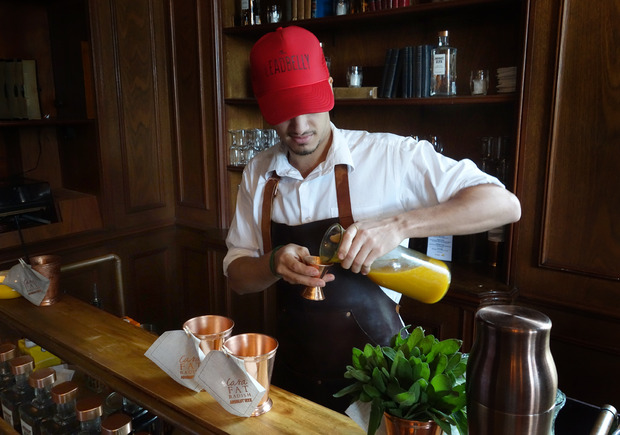
I went to school with Lauren [Holmes] from Tropicalisto—the production company we’re working with—and she was walking around an area where there are a couple of bars that everyone goes on Thursdays and Sunday afternoons. She was there one Sunday and saw people wearing Fat Radish caps. This was about a year ago, and it triggered this idea to do a pop-up during the World Cup. I’m not a crazy football fan, but I’m a crazy Brazil fan, and it was the perfect time when I knew there would be a huge international crowd here. But I wanted to do something that was slightly removed from the madness. And up here in Santa Teresa in the hills, you’re not touched by it apart from when we play the games.
People always ask us what the concept is for The Fat Radish, and for so long we had no idea how to answer that question. We had to make up a sentence, like “glorified home cooking” because we had no idea what to call it. But recently I thought, “It’s not a concept it’s a philosophy.” I think the philosophy at The Fat Radish is sourcing the best ingredients you can find, as locally, sustainably, organically as possible, and seasonally. Good for the environment and good for you. We start with vegetables since that’s what leads the seasons and then work around that. When we came here, that’s exactly what we did. There are seasons everywhere and great things being produced, you just have to find it. We started at the farmers market, there is small one here [in Jardim Botânico], an organic farmers market on Saturdays, and we met the farmers.
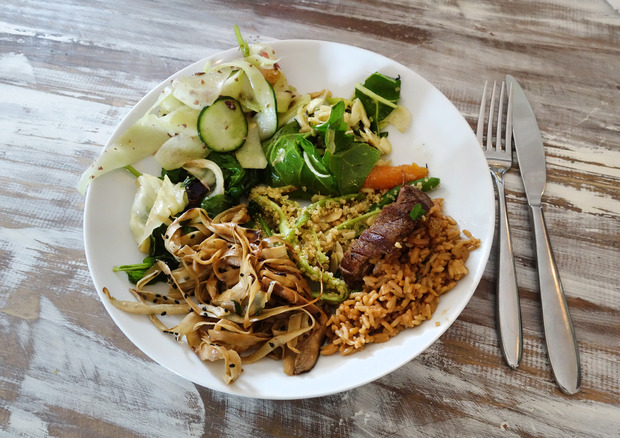
It’s shitake mushroom season at the moment, and there’s a guy who’s verging on psychotic about his obsession with shitake mushrooms—and crystals. He likes crystals and shitake mushrooms—and he grows them up in the woods, in the mountains. And he’s there, in the market, trying to tell everyone that goes past him to buy his mushrooms and, no one really gives a shit. We had Nick [Wilbur] come down, who actually does give a shit—he’s really into mushrooms—and they were just bro-ing out over mushroom patterns and how the best fungi grows. The guy is obsessed and he wants a voice and he is so excited, and as a result we’ve had shitake mushrooms on the menu this entire time, in some way, shape or form. It’s incredible. There are people with that passion here, it’s just not necessarily in the vocabulary yet of the everyday consumer in Rio. Vegetables are very hard to find on the menus here, and certainly organic vegetables are not there. It’s mostly meat, beans, rice and fried stuff.
How did you come to work with Gastromotiva?
I don’t want to go into it too much, but what really struck me [about Rio] is this huge divide in society. You hear about it, people talk about it—the divide between the wealthy and the poor—but it really had a big impact on me. So much so, that I didn’t want to do the project. For me it didn’t make sense to come here from America with this big, “I’m from New York, let’s rent a mansion in Santa Teresa with a swimming pool and have glamorous people” type of thing. It just wasn’t helping the problem—well, I’m not saying it’s a problem, because it’s just the way society is, which I believe needs to change. One-third of people in the city live in communities in the favelas, and I know how much talent and hunger to do things there is there. So I didn’t want to come here and create this bourgeois place, which is already very un-Fat Radish, if you’ve been to The Fat Radish in New York and then you walked here, you wouldn’t necessarily make a connection.
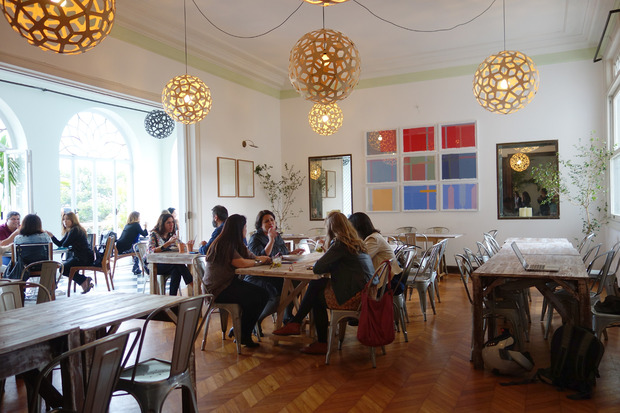
So I put this out there, and I thought about what I wanted to do. One of the greatest things that happened in my life happened yesterday, when I got to have lunch with Jamie Oliver. Why I say that it’s so important is because, during the time I didn’t want to do [this project], what I thought would be one of the best things that could happen in Rio or Sao Paolo would be the equivalent of his Fifteen Restaurant in London, where he took people from prisons and trained them and created an amazing restaurant out of it. I was talking to Andrea from Tropicalisto and said, “Wouldn’t it be amazing if you created a restaurant in Rio that was solely from kids from the communities?” We discussed it, how it could be possible.
I thought, “Now this project is really worthwhile, now we can do something.”
Then I met this guy called David, who started Gastromotiva, and basically that’s what he does. He teaches people in communities in Sao Paolo and Rio, and soon to be Salvador, how to set up businesses based around food and how to cook. It’s been a hugely successful project, but fundraising and philanthropy is not really a big thing here. We really wanted to work with him to raise awareness of the project, but at the same time, I wanted to learn from his students that had gone through the course that live in these communities. So we have some chefs that have been working with us that graduated very recently from the Gastromotiva program. It’s been so amazing having our team from New York working with them, discussing dishes and hearing stories. They [the on-site chefs] both grew up in the biggest favela in the world, and they are now here working with Nick, our Executive Chef in New York, from Colorado, and they’re collaborating on dishes. Once David said he would be involved, that’s when I thought, “Now this project is really worthwhile, now we can do something.” I feel so lucky sitting here on the last day, for the reaction of the local Brazilians. They’ve been so supportive. I had no idea the reaction would be so big.
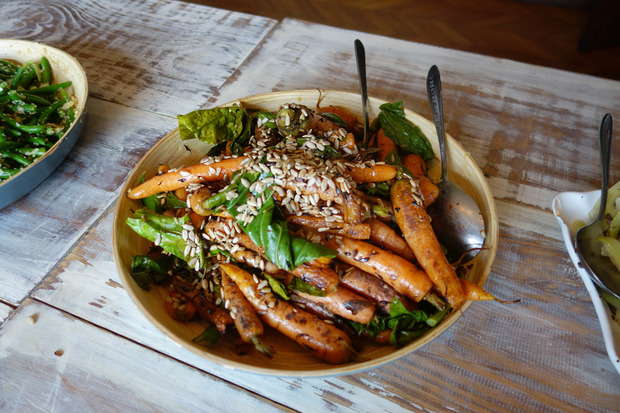
If you can see that something directly makes an impact from what you’re doing—like with this project with Gastromotiva… then it’s so brilliant to be able to support that.
Will you continue your relationship with Gastromotiva in the future?
100%. My business partner and best friend Ben [Towill] has been cycling for the last eight weeks across America on a mountain bike. He’s working with a similar foundation called Just Food. He’s been exploring America and all the farms, and we’ve been out here having a journey at the same time, and we’re both supporting these two foundations. I think about him on his bike everyday, and I was thinking, “If you can see that something directly makes an impact from what you’re doing—like with this project with Gastromotiva we can really see how it’s made a difference, and I know it’s the same with him—then it’s so brilliant to be able to support that. Because the service industry, it doesn’t matter what part—from the farmer, who’s growing the food who works 20 hours a day and is completely dependent on the weather and has to work on Christmas, his birthday, to the chefs in the kitchen who relentlessly have to come back—you only do this job for passion. For real love. It’s the worst business model in the world, it doesn’t make any sense on numbers. So you can only do it if you really care. This project with Gastromotiva has shown that you really can have an impact on things.
Like The Fat Radish has its philosophy, Gastromotiva has its philosophy and there are millions of people in the world, all over in every city, in every town, who need help. Who are interested, intrigued, passionate, hungry. Food is the most amazing way to do it. This has been incredibly hard work, but I know when I’m back in New York I will be dreaming of the next project. But I think the next stage for us is to take this idea and make it into permanent locations. I think we’ll take our company Silkstone—a lifestyle and hospitality brand—and start building permanent hotels. That’s going to be the focus on the second half of this year. I would love to do it here, I will certainly keep looking, but it will most likely be in America first.
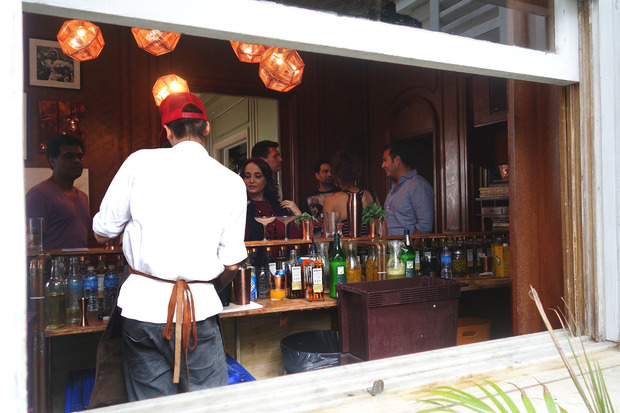
How did you get involved with Elyx?
Like with our food philosophy, we wanted to do the same thing with our partners. The whole idea is to showcase local, Brazilian talent. We’ve done that across the board, from the furniture you’re sitting in now, to the artworks—we wanted to work with local people. Absolut Elyx definitely isn’t Brazilian, but they share a similar kind of vision in terms of their integrity and how their product is made—everything is sourced locally—and how it’s distilled, the way they present themselves, it’s exactly in line with the Silkstone philosophy. Tom [Roberts] and I got chatting about this project when it came about, and we decided, if we’re going to do this, let’s really create the best cocktail bar we possibly can, to support the food. Because there isn’t a cocktail bar here, really [in Rio]—it doesn’t exist. We created a menu of what people would perceive as Brazilian drinks and cocktails, and made them our own. The product is incredible, and the team; Tato from Argentina—who’s at one of the only bars in Latin America that’s in the top 50 best bars in the world—is here, and he has just one of the nicest temperaments. He’s going to open a bar here, his energy is just so great.
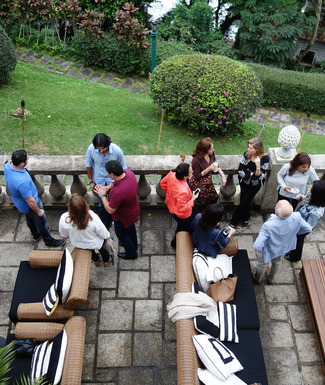
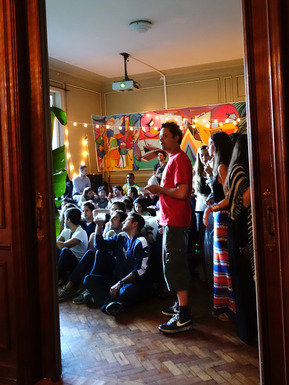
And the house ended up becoming a place for people to meet and watch games?
I didn’t know we were going to have such an amazing reaction from the Brazilians, and we weren’t even going to be open for the games up here. We were going to play them but I thought everyone would go and watch them in bars, but those have ended up being our biggest events. People just started coming up here, we had barbecues using whole animals, very Argentine buffet style. Everyone came with their whole families—grandmas, uncles, kids—and everyone’s in a Brazil shirt and nothing else matters. I’m going to miss that a lot. Every time I ever see a Brazil game on television for the rest of my life I’ll think about those moments and smile, so much. This has just been perfect.
Photos by Karen Day


